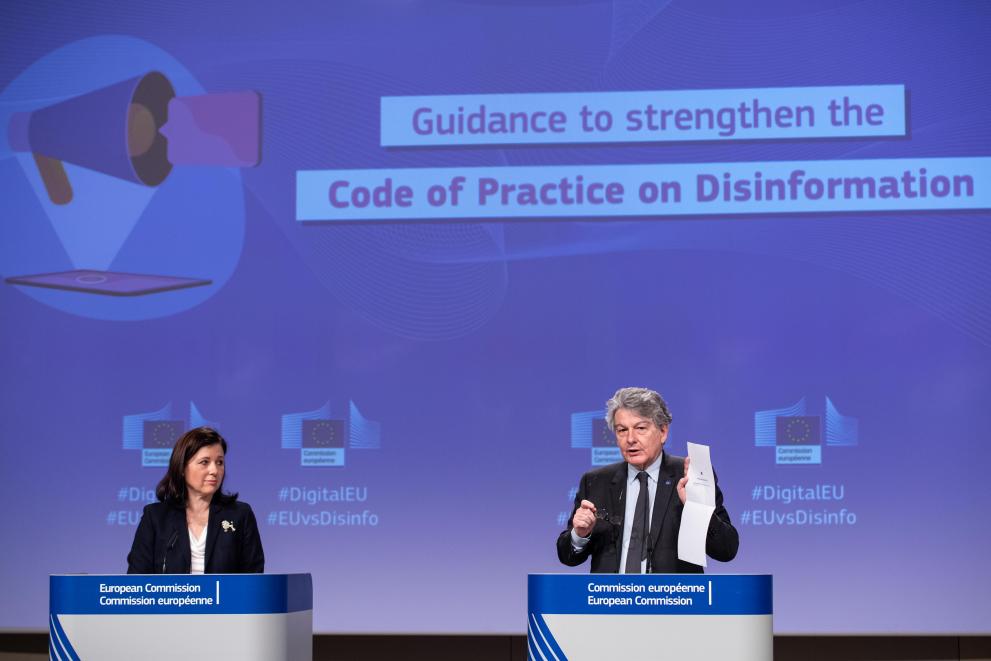
Eight new prospective signatories joined the revision process of the Code of Practice on disinformation during the latest signatories Assembly meeting yesterday. They expressed their willingness to take commitments under the strengthened version. The Code is the first such framework worldwide setting out commitments by platforms and industry to fight disinformation. The revision of the Code is based on the Commission's Guidance issued in May, which sets out how the current Code should be strengthened to provide a firm response to disinformation. The list of prospective new signatories includes online video platforms like Vimeo, new types of social networks like Clubhouse, and advertising technology providers like DoubleVerify, as well as organisations that provide specific expertise and technical solutions to fight disinformation, such as Avaaz, Globsec, Logically, NewsGuard, and WhoTargetsMe.
Substantial additional efforts are needed to reduce the flow of harmful disinformation, as illustrated by recent electoral campaigns and by the signatories' reports on the COVID-19 disinformation monitoring programme. The current Code was a good first step in this direction, but the Commission's Assessment in 2020 revealed significant shortcomings. These include inconsistent and incomplete application of the Code across platforms and Member States, gaps in the coverage of the Code's commitments, a lack of appropriate monitoring mechanism, including key performance indicators, a lack of commitments on access to platforms' data for research on disinformation and limited participation from stakeholders, in particular from the advertising sector. The Commission expects signatories to closely follow the Guidance when revising the Code to make sure that it lives up to the expectations for a strong EU instrument.
Věra Jourová, Vice-President for Values and Transparency, said: “I am pleased to see new actors from relevant sectors answering our call and engaging in the overhaul of the Code of Practice. I encourage others, including platforms, messaging services and actors in the online advertising ecosystem, to join as soon as possible to co-shape the process. The strengthened Code cannot fall short of the expectations we have set out in our Guidance from May. Online players have a special responsibility regarding spreading and monetising disinformation. They must become more transparent, accountable and safe by design.”
Thierry Breton, Commissioner for Internal Market, added: “I welcome the fact that more and more online platforms, technology providers, civil society and expert organisations are formally committing to fighting disinformation. The private sector should be ambitious and anticipate the new EU rules on digital services (DSA). Now is the time to show they walk the talk.”
The Commission calls on all other interested parties that can contribute to the strengthened Code and willing to take on commitments related to their services to manifest their interest to become signatories of the strengthened Code and join the drafting process as soon as possible. This call is notably addressed to established and emerging platforms active in the EU, relevant stakeholders in the online advertising ecosystem (e.g. ad exchanges, ad-tech providers, brands benefitting from ads, communication agencies), other players providing services that may be used to monetise disinformation (e.g. e-payment services, e-commerce platforms, crowd-funding/donation systems), private messaging services, as well as stakeholders that can contribute with resources or expertise to the Code's effective functioning, are also welcome to join the Code. The strengthened Code should include new tailored commitments corresponding to the size and nature of services provided by signatories, with signatories expected to take relevant commitments related to all their services.
Reports on the COVID-19 disinformation-monitoring programme on the platforms' summer actions
As part of the regular monitoring dedicated to COVID-19 disinformation, the Commission also publishes today the reports from Google, Facebook, Twitter, TikTok and Microsoft that include the actions taken by the platforms in July and August to reduce COVID-19 and vaccines disinformation. As laid out in the 2020 Joint Communication, the European Regulators Group for Audiovisual Media Services (ERGA) is assisting the Commission with the COVID-19 monitoring programme with its expertise. ERGA is expected to deliver its report on the monitoring programme in the coming weeks.
Background
The Code of Practice has been established in October 2018. As announced in the European Democracy Action Plan (EDAP), the Commission issued Guidance to strengthen the Code of Practice on Disinformation in May 2021 to address the shortcomings identified in the Commission's 2020 Assessment of the Code and draws from the lessons learned in the COVID-19 disinformation monitoring programme. The Commission's proposal for the Digital Services Act (DSA) establishes a co-regulatory framework for Codes of Conduct, such as the Code of Practice.
The Guidance calls for reinforcing all chapters of the Code: the monetisation of disinformation must be reduced, measures against manipulative techniques must be stepped up and users should have access to tools to understand and flag disinformation and safely navigate in the online environment. The Code should also increase the coverage of fact checking across all Member States and languages, and drastically improve the access to platforms' data for research. The signatories should also set up a publicly accessible Transparency Centre, and a Permanent Task Force will be in charge of adapting the Code in view of technological, societal, market and legislative developments. The reinforced Code needs to be complemented by an effective monitoring framework, based on clear key performance indicators for measuring the efficacy of the actions implemented under the 2021 Code. Signatories are expected to deliver the revised Code by the end of 2021.
During the COVID-19 crisis, signatories effectively participated in a dedicated Monitoring Programme. It has proven to be a useful transparency measure to ensure platforms' public accountability and has put the Code through a stress test. At the same time, the COVID-19 programme highlighted a number of shortcomings that need to be addressed by the strengthened Code.
For More Information
Code of Practice on disinformation
Commission Guidance on Strengthening the Code of Practice on Disinformation
Details
- Publication date
- 4 October 2021
